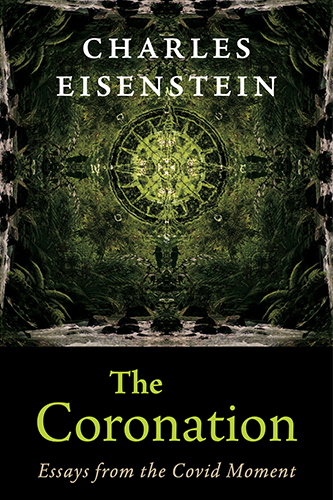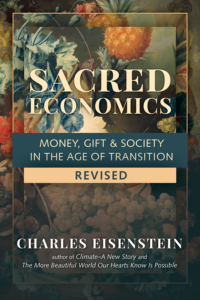Climate — A New Story
Chapters
Chapter 2: Beyond Climate Fundamentalism
Does Nothing Else Matter?
“Someday, Charles, you are going to have to decide if you want to be relevant.”
So said to me a prominent environmentalist after hearing me describe the diverse fields of my activity and interest. What he meant was something like this:
There is a shrinking window for climate action before irreversible feedback loops render human extinction inevitable. Therefore, the only relevant action you can take right now is to put 100 percent of your efforts into cutting greenhouse gas emissions as swiftly as possible by whatever means necessary. Your other interests are irrelevant. If we don’t implement a meaningful carbon tax soon, then the healing of the relation between the masculine and feminine won’t matter. Nor will saving the whales. Nor will ending the school-to-prison pipeline. Social justice, education, psych meds, holistic medicine, scientific anomalies, attachment parenting, community building, new economics, philosophy, history, cosmology, neo-Lamarckian biology, sacred plant medicines, nonviolent communication, plant intelligence, threatened languages, indigenous sovereignty, pansubjective metaphysics—none of the issues you write about matter unless they have a direct, significant, near-term impact on greenhouse gases. Once we’ve won that fight, we can turn our attention to those other things. So are you going to join the fight?
This pattern of thinking is called fundamentalism, and it closely parallels the dynamics of two defining institutions of our civilization: money and war. Fundamentalism reduces the complex to the simple and demands the sacrifice of the immediate, the human, or the personal in service to an overarching ulterior goal that trumps all. Disciplined by the promise of heavenly rewards or hellish punishments, the extreme religious fundamentalist shuts down his humanity in service to what his religion says God wants. Disciplined by economic exigency, millions of people sacrifice time, energy, family, and what they really care about in pursuit of money. Disciplined by an existential threat, a nation at war turns away from culture, leisure, civil liberties, and everything that is of no utility to the war effort.
Anyone who is wary of these institutions might also be wary of the standard climate change narrative, which lends itself to the same focus on a universal cause and the same mentality of sacrifice to an all-important end. If we agree that the survival of humanity is at stake, then any means is justified, and any other cause—say reforming the prisons, housing the homeless, caring for the autistic, rescuing abused animals, or visiting your grandmother—becomes an unjustifiable distraction from the only important thing. Taken to its extreme, it requires that we harden our hearts to the needs in front of our faces. There is no time to waste! Everything is at stake! It’s do or die! How similar to the logic of war. No wonder, as a community organizer just told me, there is such hostility toward environmentalists among inner-city and other impoverished populations. They are the ones whose needs are ignored and indeed who are sacrificed first in the war effort.
While this book is focused on the realm of ecological healing, it disengages from the rhetoric of “Nothing else is important compared to this.” That’s the rhetoric that has alienated so many working-class people and minorities from environmentalism, because it carries a patronizing message of “We know better than you do what you should be caring about.” It invalidates their grievances. Because, really, what does racially biased stop-and-frisk policing and the criminalization of large segments of the population matter in the face of civilizational collapse? What does sweatshop labor or carcinogens in the water supply matter, when climate change might render Earth inhospitable to human life? Your concerns are not important. If we carry this belief, even without being so impolitic as to voice it, we are going to radiate a crusading energy that is attractive only to our fellow fundamentalists.
If we want to foster a broad social consensus to protect and heal the planet, then we need to undo this logic at the source. The mind that is steeped in Separation protests, “But it is true! None of these things are relevant if the atmosphere warms by ten degrees.”[1] This belief depends on a world-story that does not recognize the intimate interconnectedness of all things. If we see reality as a collection of separate, causally dissociated phenomena, then of course it will seem that stopping gentrification in Brooklyn or sex trafficking in Haiti is frivolous in the face of climate change.
From the Story of Interbeing, we intuit different kinds of cause and effect. We are not surprised that in a carceral society that locks up millions of its members, those outside the prisons lose their freedom too. We are not surprised that when a nation perpetrates violence around the world, that no amount of security, surveillance, walls, or fences can keep violence from sneaking back in, as domestic violence or self-destructive habits. And we are not surprised that environmental pollution and habitat degradation are mirrored in bodily illness and the degradation of our inner landscapes. The illusion of separation has us think that one could conceivably thrive on a poisonous planet with the right air filters, water filters, EMF blockers, supplements, air conditioners, antibiotics, antifungals, bug zappers, and so on, replacing a world of nature with a world of technology. In interbeing, we know that health for one is impossible to sustain without health for all.
If we want solidarity, we need to understand that genocide and ecocide, human degradation and ecological degradation, are part of the same fabric, and that neither will change without the other changing. It is not that we should pay attention to racial or class injustice with the strategic goal of bringing those people into environmental activism. It is to recognize that healing on any level contributes to healing on every level. Because we are unaccustomed to thinking holistically, it seems counterintuitive that starting a social enterprise that employs homeless people will help stop climate change; the causal links are not evident to our way of seeing. Our dominant system of knowledge production (science) operates by controlling variables, breaking wholes into parts, and establishing measurable, predictable causal mechanisms. Then the knowledge is culturally legitimate. But the causal threads that link homelessness to ecological ruin are neither measurable nor predictable. Indeed, a cynic, channeling Ebenezer Scrooge, might argue that rehabilitating homeless people worsens climate change by transforming them into consuming members of society.
Of course, it is possible to construct an argument that housing the homeless contributes to the health of the biosphere, but it will not easily fit into the language of climate policy, nor is it likely to convince Mr. Scrooge. However, when Scrooge undergoes a shift in consciousness and sees the world through the eyes of interbeing, he will expect that the two phenomena are related. Believing in an innate intelligence pervading all phenomena, he might surmise that a society inhospitable to its vulnerable members will be mirrored by a planet that is inhospitable to society. He will expect that the deep roots of homelessness are common with the deep roots of climate change. Instead of “fighting homelessness” he will seek to understand the bed from which it arises. He will understand that it is okay to devote himself to what stirs his compassion the most, confident that what he is doing is still “relevant” in the face of global crisis. And he will no longer operate from self-preservation and survival anxiety, because he will understand that his well-being is inseparable from that of all in his expanding circle of love.
The question to explore then is what induces a shift to the consciousness of interbeing? Scrooge’s creator Charles Dickens knew. It is through a confrontation with beauty, suffering, and mortality. It is through a connection to what is real. One might call it an initiatory experience. Without it, the grip of self-preservation and survival anxiety never loosens. We might try to leverage those fears (through the threat of climate change) to motivate pro-environmental behavior, but invoking self-interest to solve a problem caused by runaway, blind self-interest merely adds fuel to the fire. We need the opposite: to expand the circle of compassion to include every being on this earth.
End Notes
[1] Degrees Celsius. In this book I will use the metric system unless otherwise noted. Actually I prefer traditional measures for everyday use, and the metric system for scientific applications. Traditional measures are less arbitrary; they relate to human experience (knuckles, feet, strides, a very cold or hot day, etc.). The metric system, in contrast, wipes out local and cultural differences and replaces them with a global standard. Like the commodification of nature and culture, this has been seen as progress.






